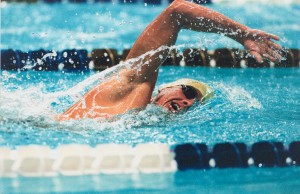Swimming has been important part of my life every since I was a kid. Although I played competitive football, basketball, and baseball when I was younger, I didn’t start swimming competitively until high school.
Any team sport can carry with it a number of lessons in discipline, pushing yourself, and working together, but, for me, swimming brought all of these to a whole other level.
Sure, there are some other obvious takeaways from swimming: you learn to manage your time better between crack-of-dawn practices and weekly swim meets, your back becomes noticeably more muscular, and you learn an important skill that can help you save a life. But the significance of swimming transcends all of the above.
Breaking it Down
Aside from running and gymnastics, swimming is one of the simplest sports out there. There’s no ball to dribble nor any intricate formation of players to think about. In swimming all you think about is controlling your mind and keeping it in tune with your body. Stroke after stroke. Lap after lap.
Take a look at any underwater footage taken from a professional competition like the Olympics and you get to see just how precise and defined each movement a swimmer makes is.
In the pool, you have to think about every movement you make. The smallest technical difference can make or break you. If you’re flip-turn is a half-second too early or late, if you overextend your arm in freestyle stroke, if you dive a hair too deeply from the bulkhead–you may totally change the outcome of the race. Even though it’s just you and the water, it’s so much more.
Your Team
But while swimming is a deeply personal sport, it is also a team sport. When you’re in practice, you’re constantly pushed and being pushed by your fellow teammates do be better. There are the hard practices and the really fun ones.
When it’s time for a meet, you kick up your support to a whole other level. Suddenly your friends and teammates are no longer just trying to improve–they’re racing against the clock, they’re racing against other players from other teams. A static of support fills the air.
But your team is more than just the people that swim next to you. It’s the coaches that offer you guidance, your teammate’s family, and your family.
Watching high school swimming from the stand might not be as exciting as watching an underwater camera account of Michael Phelps in the Olympics, but family members still come out and offer their support and it makes a world of difference. Even though your event may only last 45 seconds, it means the world to have a community sharing that same slim window of make-or-break time with you.
…
I don’t have the time to competitively swim in college currently, but I carry the discipline and the sense of community that swimming has left with me wherever I go, in the water and on dry land.
For more swimming and sports updates follow me on Twitter @Nick_Fainlight.
